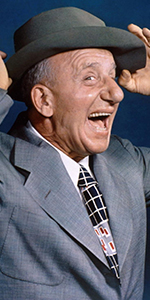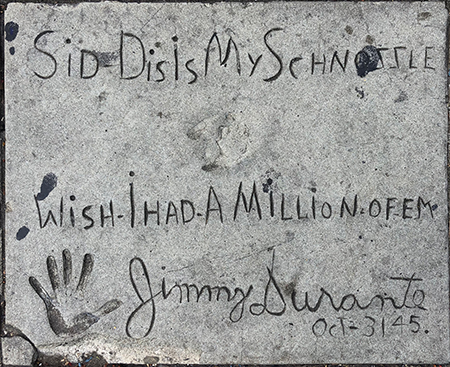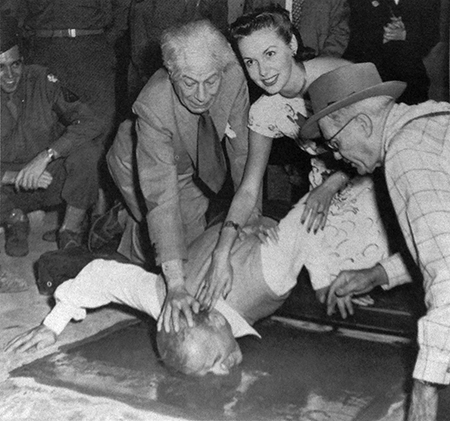 |
 |
 |
 |
 |
| Jack Oakie, unknown date. |
| |
|
 |
|
 |
| |
| |
| |
| |
| |
| |
| |
|
|
| Jimmy Durante
|
 |
| Forecourt Ceremony held on Wednesday, October, 31, 1945 |
| |
Born: February 10, 1893, in New York City, New York
Age at the time of the ceremony: 52
Died: January 29, 1980, in Santa Monica, California, age 86 |
| |
Jimmy Durante was another of the great all-round showbiz people during the Golden Age of Hollywood. Odd-looking (with his famously large nose), gravel-throated, with boundless energy, always looking for girls and the next laugh, Durante — once encountered in person, on film, on the radio, on television, on stage — is always remembered.
Born to Italian immigrants in New York, Durante was raised as a Catholic. Hard to imagine him as an altar boy, but it's true. He dropped out of the seventh grade in order to play ragtime piano in saloons and bars in the city, eventually getting a slot in the Original New Orleans Jazz Band — the only member not from the Big Easy. The group made recordings under this name, but by 1920, Durante's habit of telling jokes and breaking into song at the keyboard made him the star, and the group was re-named Jimmy Durante's Jazz Band.
Vaudeville was next, with Durante on the road with Lou Clayton and Eddie Jackson. Durante and Jackson both made their Broadway debuts in the George Gershwin Musical Show Girl in the 1929 season. They both made their film debuts in Roadhouse Nights (released in February 1930).
After enjoying a major success with his recording of his song "Inka Dinka Doo," Durante was sought after for both the screen and the stage. He was the star of the Broadway show Jumbo in the 1935-1936 season, the Cole Porter Musical Red Hot and Blue in the 1936-1937 season, and the revue Keep Off the Grass in the 1940 season.
But Durante was also sought after to appear in films, and while not usually the star, he always made a lasting impression in films like The Wet Parade (which had its Premiere at the Chinese in March 1932), and The Phantom President (released in September 1932), where he sang his original song about his nose, "Schnozzola." He made three films with Buster Keaton, Speak Easily (released in August 1932), The Passionate Plumber (released in February 1932), and What! No Beer? (released in February 1933), but the comic styles of the two men were so different, with Keaton suffering in comparison.
In September of 1933, Durante joined the cast of The Chase and Sanborn Hour on NBC, and stayed until November. When host Eddie Cantor left the show in April 1934, Durante took over and stayed until September 1934. After that, Durante had his own show called The Jumbo Fire Chief Program on NBC from October 1935, to January 1936.
More films for Durante
include George White's Scandals (released in March 1934), Sally, Irene and Mary (which played the Chinese in March 1938), and You're in the Army Now (released in December 1941).
Durante gives his most "out there" performance as Banjo, in the comedy The Man Who Came to Dinner (released in January 1942), with Monty Woolley.
On radio, Durante teamed with Gary Moore for The Durante-Moore Show on both NBC and CBS from March 1943 to June 1947, and as The Jimmy Durante Show on NBC from October 1947 to June 1950. Sid Grauman had Durante down to the theatre in October 1945, and with actress Joan Thorsen, they both pushed his "Schnozzola" into the cement.
Durante got fewer roles in films after World War II, but still appeared in Two Sisters from Boston (released in April 1946), and It Happened in Brooklyn (released in April 1947). All through the 1950s Durante was on television a good deal, then he returned to the screen in Billy Rose's Jumbo (released in December 1962), and It's a Mad, Mad, Mad, Mad, World (released in December 1963).
Durante did a ton of television, appearing on shows like Texaco Star Theatre in 1949. He had his own show, The Jimmy Durante Show in the 1955-1956 season on NBC, Perry Como's Kraft Music Hall in 1958, Sunday Showcase in 1959, Make Room for Daddy in 1961, The Jack Benny Program in 1962, The Judy Garland Show in 1963, The Ed Sullivan Show in 1963, Summer Playhouse in 1964, Shindig! in 1965, The Sammy Davis, Jr. Show in 1966, Bob Hope Presents the Chrysler Theatre in 1966, The Hollywood Palace in 1966, and Jimmy Durante presents the Lennon Sisters in 1970.
Durante became a pitchman for Kellogg's Corn Flakes during the 1960s. In his later years, Durante turned to recording standards and his own songs, many of which are heard in films today: "As Time Goes By" and "Make Someone Happy."
Durante retired from performing after a stroke in 1972. He died of pneumonia in 1980 at the age of 86. |
|
|
|
|
| |
 |
 |
| Grauman's Chinese Theatre, Hollywood, California. Jimmy Durante Forecourt block. Executed by Jean Klossner, Wednesday, October 31, 1945. 38 x 31 inches. |
 |
 |
 |
| Grauman's Chinese Theatre, Hollywood, California. Jimmy Durante Forecourt ceremony, Wednesday, October 31, 1945. Sid Grauman and actress Joan Thorsen push Jimmy Durante's "Schnozzola" into the cement as cement artist Jean Klossner looks on. |
|
|